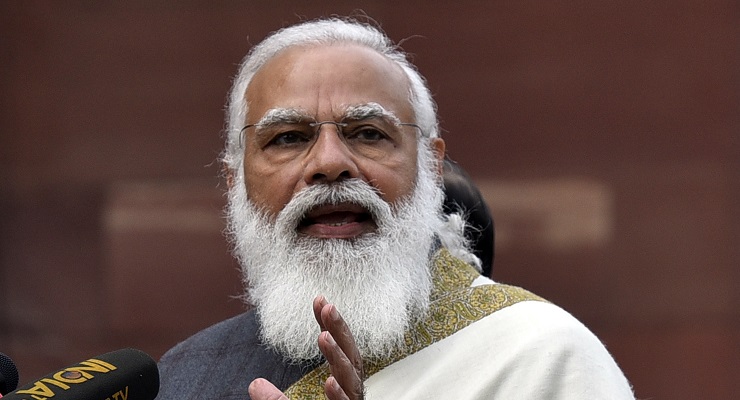
Australia and India have never been closer.
Foreign Affairs Minister Marise Payne and Defence Minister Peter Dutton were in New Delhi at the weekend at a historic meeting with their Indian counterparts, hoping to expand trade and military ties. After a decade of unsuccessful negotiations, a free trade agreement (FTA) could be imminent. Just last week, India’s External Affairs Minister S Jaishankar said during a lecture at the Australian National University that there was a “tailwind” behind negotiations for an FTA.
But as the Morrison government continues to deepen its ties with India, Narendra Modi’s far-right Hindu nationalist government has received worldwide condemnation for the erosion of democracy and human rights, and systemic discrimination against Muslims.
As the government rushes headlong towards finalising an FTA, the Greens and Human Rights Watch are urging it not to overlook the Indian government’s poor human rights record.
Democracy unravelling
Australia’s relationship with India is often talked up with reference to shared democratic values. It’s also become more important in a context of increasingly tense bilateral ties with a more assertive China.
But under Modi’s Bharatiya Janata Party (BJP) government, those democratic values are threatened. Earlier this year US think tank Freedom House downgraded India to a partially free democracy. Other NGOs are calling it an “electoral autocracy”.
That assessment reflects the authoritarian Hindu nationalist impulses of Modi and the BJP. Since 2019 the government has put the Muslim majority region of Jammu and Kashmir under forms of strict lockdown and communications blackouts. Laws introduced in 2019 to base citizenship on religion and exclude millions of migrant workers led to widespread anti-Muslim violence. Numerous activists and journalists critical of the ruling party have been arrested on spurious grounds.
It’s because of this recent history that Greens Senator Janet Rice wants any FTA to include binding clauses that commit to upholding democracy.
“Clearly given the Indian FTA is back on the agenda again, we’re going to be pushing hard to say: ‘Come on! Open your eyes to what’s going on.’ The focus on India particularly in contrast with China is about them being the largest democracy in the world. But it’s only a democracy for certain groups in India. Bad luck if you’re Muslim, if you’re Indigenous, if you live in Kashmir,” she said.
Human Rights Watch Australia director Elaine Pearson tells Crikey an agreement should not be negotiated without serious consideration of India’s discriminatory laws and policies.
“It’s not enough to have empty, vague pledges about human rights and democracy if governments aren’t acknowledging those in practice,” she said.
Pearson and Rice both pointed to EU FTAs — which regularly contain provisions for human rights and labour rights — as a model Australia should try to emulate.
The Modi lovefest
Coalition MPs have been increasingly vocal in their criticism of China’s human rights record. But there’s been near total silence over the BJP’s treatment of minority groups and political opponents. Instead the Morrison government has made a big show of its relationship with the BJP.
Prime Minister Scott Morrison regularly takes to social media to praise Modi. Recently former prime minister Tony Abbott was sent to India to try to accelerate trade talks, and returned full of fawning praise for Modi.
But the capture of India’s government by the BJP, a political party with religious fundamentalism in its DNA, has meant Australian politicians seeking to exploit the India relationship find themselves getting dangerously close to Hindu nationalist extremism.
Last year former NSW Liberal premier and Australia’s high commissioner in New Delhi Barry O’Farrell met and praised the head of the Rashtriya Swayamsevak Sangh (RSS), the BJP’s Hindu supremacist parent organisation with a history of anti-Muslim violence. Recently Nationals Senator Matt Canavan joined a webinar with Ram Madhav, a former member of the RSS’ national executive.
Pearson believes that if Australia wants to be taken seriously as a country that purports to care about human rights, our governments need to be principled and consistent in calling out all countries, friendly or not.
“If Australia wants to have legitimacy in speaking out against one government, it needs to find its voice — whether it’s India, whether it’s Indonesia, whether it’s China,” she said.








India has been on the slide politically for some time, with that super-charged since the election of Modi. We should be engaging with India, always should have placed them much higher in our priorities. But not without some commitments to transparency and democratic values. Would be useful if we could have some interest in transparency and democratic values here too.
It just shows how ignorant and/or amoral the Australian government has become. Modi and the RSS are a nightmare to many many poeple in India,and to its educated class, who understand what’s going on.
“The economy comes first, Stupid!” – it’s daylight between that and whatever runs second – including health.
Nothing trumps getting re-elected in Morrison and his inner circle of very ordinary cabinet buddies. Including any adherence to principles, decency, honesty, openness, or any other supposed virtue. So nothing s said about modi’s sins, and the USA and it’s lapdogs didn’t acknowledge the true perpetrators of 911 – the Saudis!
The notion that Liberal politicians have any serious understanding or commitment to human rights, as opposed to property rights, is laughable. They fawn on security services and forms of power generally. Labor politicians usually have a better intellectual grasp but are very variable in their commitment.
This prospective agreement should be met with much more publicity about the illiberality of Modi and the extreme and violent incidents he promotes and tolerates. Then there’s the buckets of corruption but no doubt the Coalition can be very understanding about that.
“FTA”? What a great brand name for a toilet paper…..
Good luck getting a FTA. India already have a revolt with their small farmers being taken over by agribusiness. Australian agricultural products will continue to be heavily tariffed or else there might be a revolution.